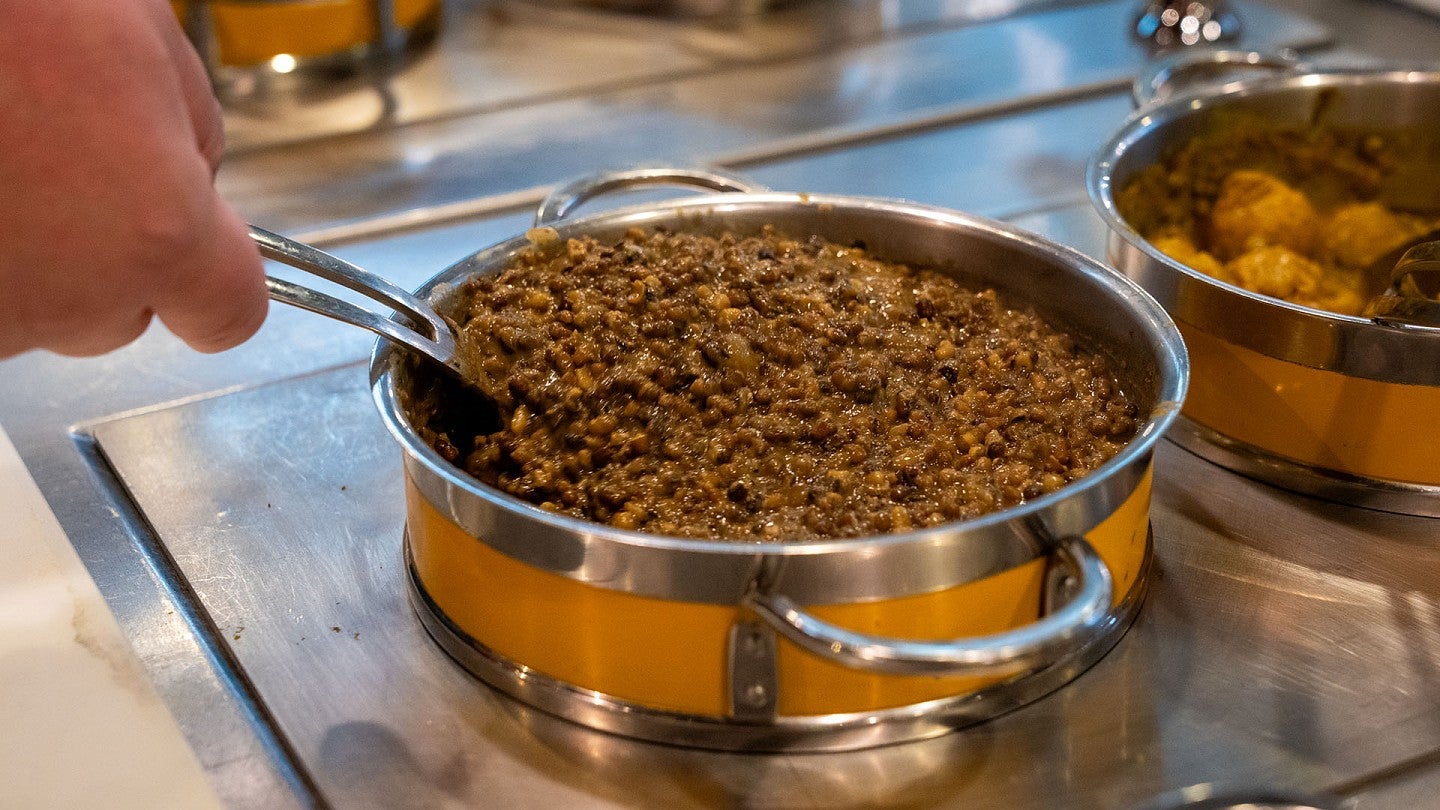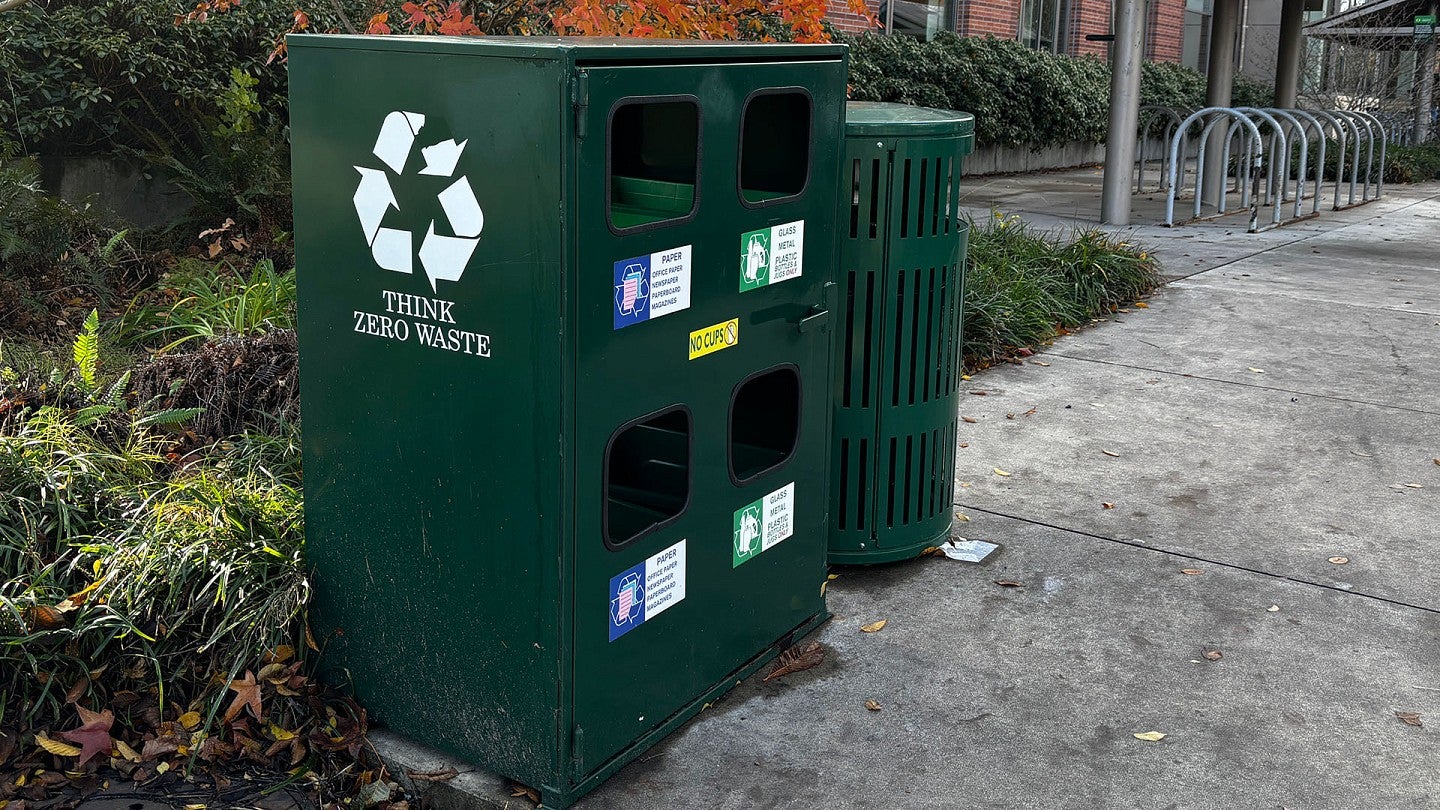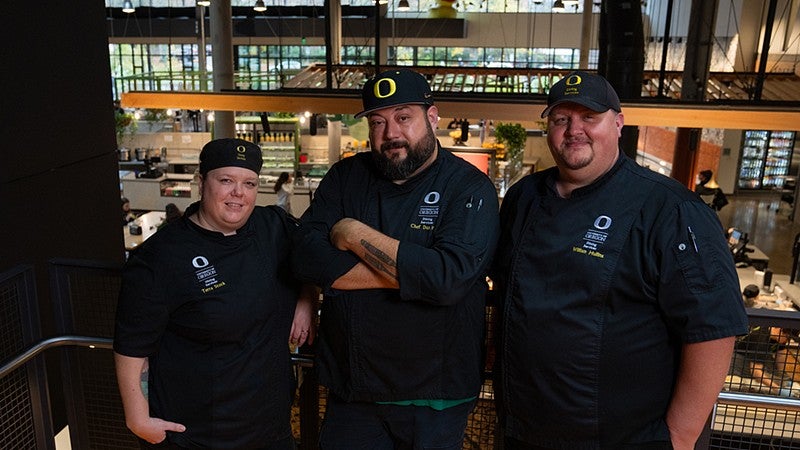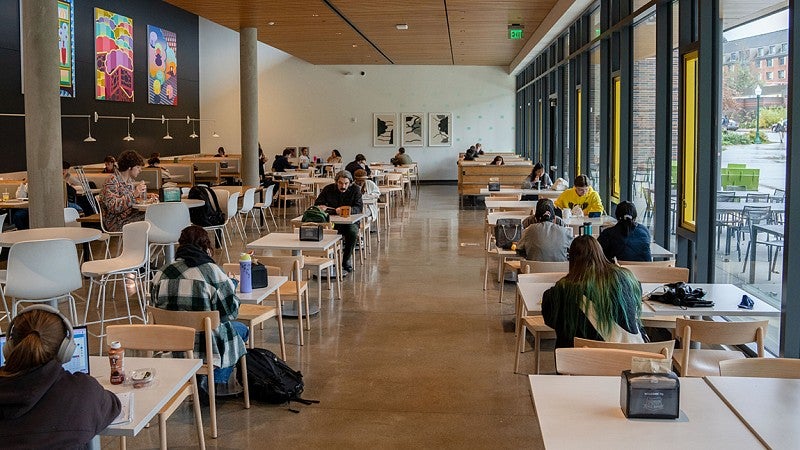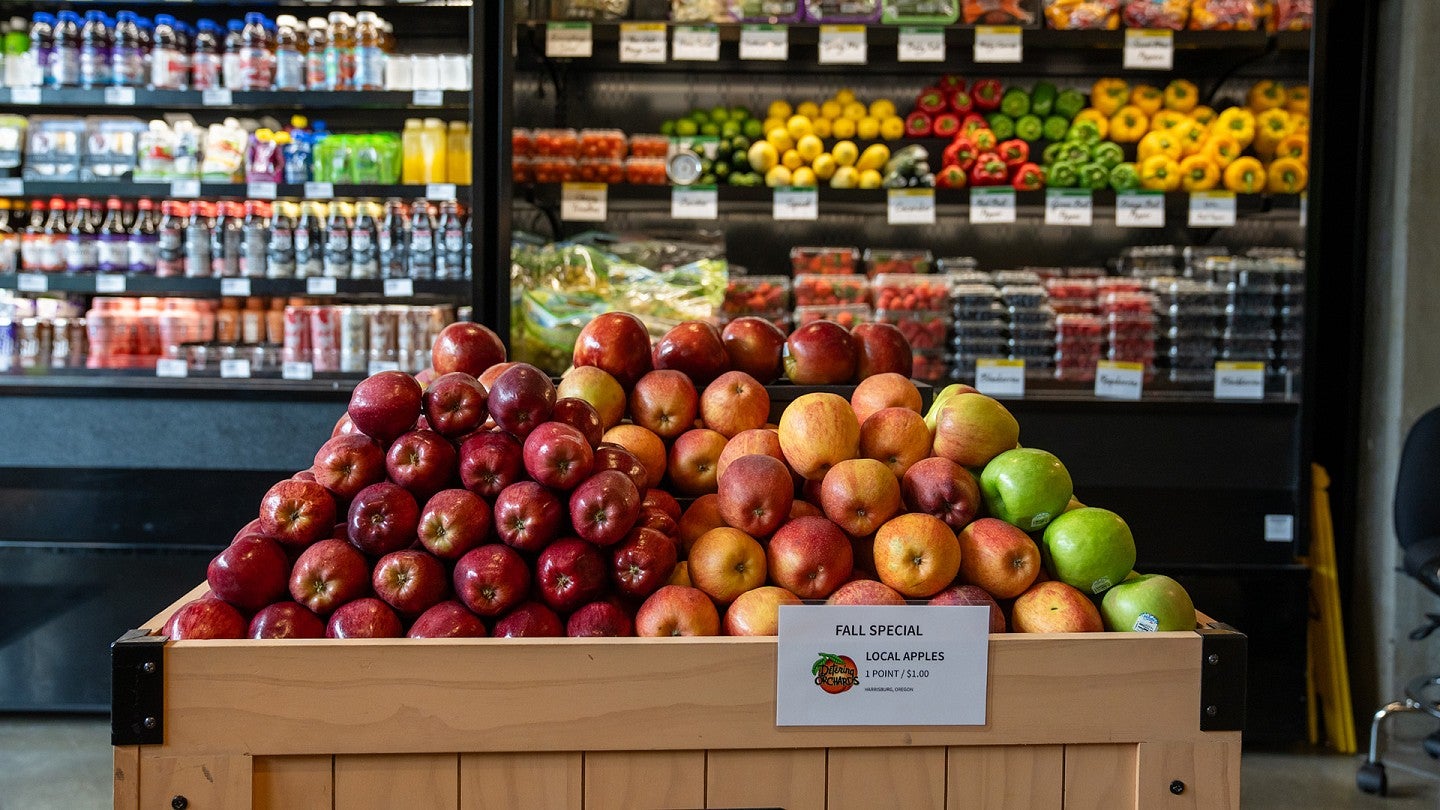
UO’s campus dining serves up good food, and sustainability
Chefs and staff work to create menus that keep both students and the environment healthy
The staff at University Dining is not taking the easy road on their mission to serve 16,000 meals a day to thousands of hungry Ducks.
Instead, they’re aiming to make the most delicious, nourishing food they can, in the most sustainable way possible. And they’re willing to put in a little extra work to make that happen.
“It would be a lot easier if we just bought canned soup and bagged bread,” said William Mullins, assistant director of culinary operations. “But we want to make incredible food from scratch, source local ingredients, and practice sustainability in everything we do.”
That work is paying off, for both the quality of food and the environment.
With 5,800 students grabbing three meals a day, the environmental footprint of University Dining could really add up. But the UO’s dining team has prioritized sustainability in its operations for decades to reduce its environmental impact.
Every step of the process, from sourcing ingredients to handling waste, is constantly assessed and refined to ensure campus dining venues are remembered for the delicious food they serve, not the environmental mess they’re leaving behind.
“Caring for the environment is ingrained in the ethos of everyone who works for UO Dining and lives in the beautiful Willamette Valley,” said Tom Driscoll, associate director of university housing and director of dining services. “We want to maintain and sustain the environment that makes Oregon so special, and we want to utilize the amazing local products and local suppliers that surround the UO.”

From farm to fork
Many of the ingredients featured on the daily menu don’t have to travel far to get to a student’s plate. UO Dining works with more than 25 local farms, bakeries and vendors to reduce its use of carbon-pumping trucks and to showcase the fresh fare of the Willamette Valley and the Pacific Northwest.
When Mullins started as a chef in the central kitchen seven years ago, he loved that local, high-quality ingredients were prioritized over processed and canned food. Not only does it curb the volume of emissions involved in sourcing ingredients, it enables chefs to make better food, he said.
“We’re all foodies at heart who want to serve really, really good food,” Mullins said. “A big part of doing that is understanding where our food comes from and making intentional choices about what food we use — and how it’s sourced and grown.”
Mullins has seen exactly where a lot of the UO’s food comes from, and he says it’s hard to beat the bounty you can find around the Willamette Valley, including ingredients like blueberries from Confluence Farms, tofu from Surata Soyfoods, pears and apples from Detering Orchards, pork from Carlton Farms, bread products from the Bread Stop, and grains and legumes from Hummingbird Wholesalers.
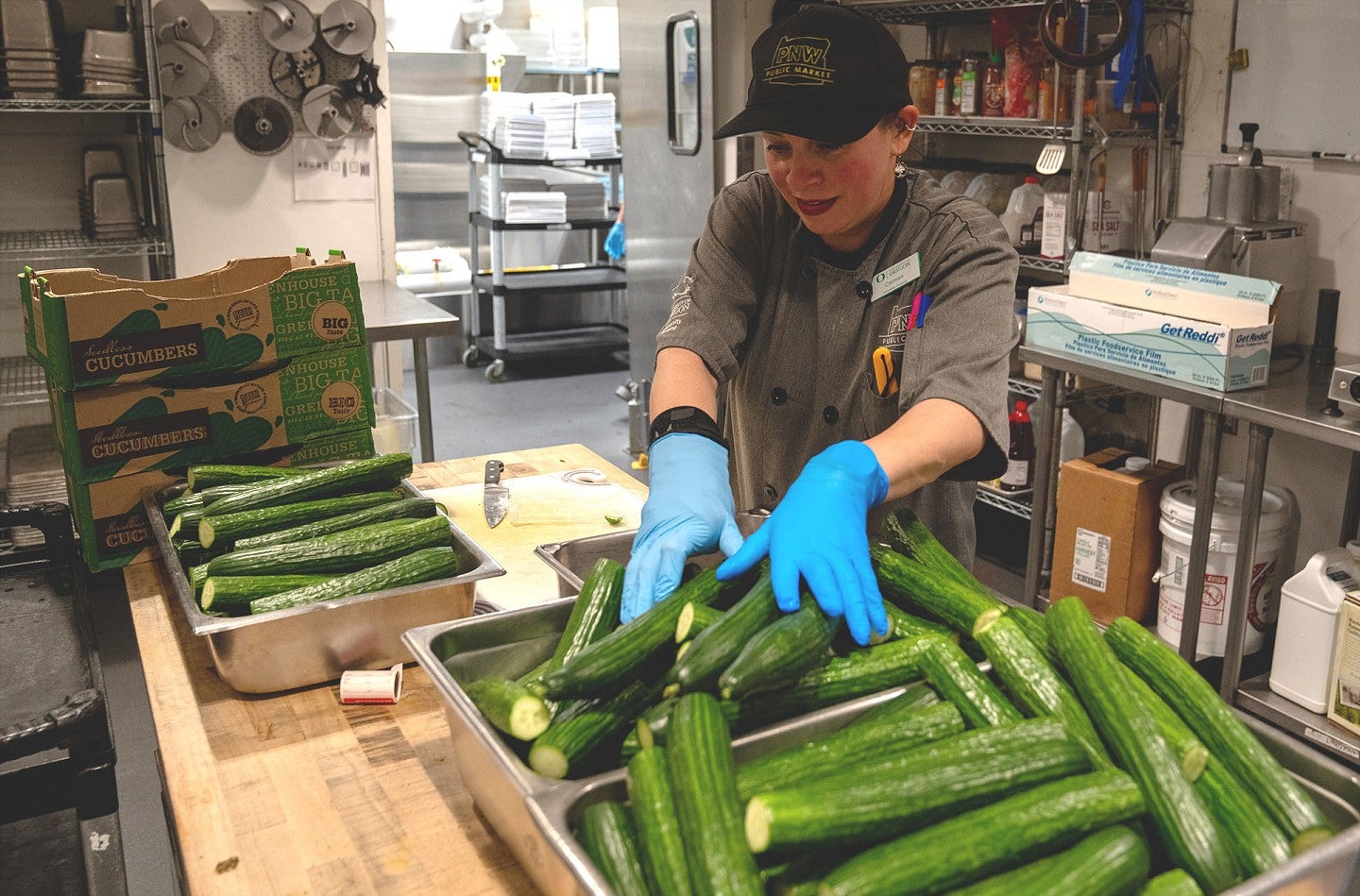
Many of those vendors share the UO’s commitment to environmentally friendly practices, making their offerings an even better choice for sustainability.
Mullins remembers visiting the UO’s egg supplier, Wilcox Farms, at its location outside Junction City last year. Wilcox Farms practices sustainable agriculture and environmental stewardship throughout its operations to raise certified humane hens.
It works with an environmental scientist to sample soil, water and plants from across its acreage and uses that data to guide business decisions. And instead of trucking in lots of chicken feed, it uses their pastures and mobile chicken coops to feed many of their hens, which allow the birds to forage and feast on the farm’s grasses, plants and grubs.
And Mullins said you can “100 percent taste the difference” between a commercial egg and a Wilcox egg.
University Dining also tries to produce a lot of its food on-site, like naan, tortillas and pizza dough, which are all baked with local grain in UO kitchens. And the menus across campus are a constant celebration of local, seasonal ingredients.
This fall, the dining venues were bursting with food featuring apples, pears, citrus and squash. University Dining also hosts an annual “Farm to Fork” dinner, which showcases the local farms and vendors in every course. That means students can really appreciate exactly where their food comes from and the many nutritional and environmental benefits it offers.
Taking the trash out
A few years ago, Lynn Alvarez, assistant director of residential dining, was thinking about ways to shift her food practices at home to reduce her personal waste. As she went through that exercise, she realized she could have a much larger impact if she worked with University Dining to reduce waste across the Eugene campus.
Alvarez helped spearhead a university-wide transition away from disposable and compostable utensils and flatware. University Dining now features reusable spoons, forks, knives, plates, baskets and bowls throughout its dining venues, which students can either use on-site or take anywhere on campus.
The dining team has collaborated with custodial services to maintain pickup sites, and they’ve worked with residential advisers and the student-led Zero Waste Program to educate diners on the importance of returning their utensils and flatware.
In its first year, the effort prevented 510,000 items from going to landfills and reduced the use of compostable garbage can liners by 2,300 bags. It also saved the UO more than $31,000 in costs. University Dining won the Sustainability Award grand prize from the National Association of College & University Food Services in recognition of its efforts to promote environmental sustainability in campus dining operations.
While the COVID-19 pandemic slowed the integration of reusable dining items, University Dining has since picked things back up and is cutting a record-setting amount of waste from its operations. Last year, it saved more than 2.7 million items from the trash and cut $189,000 in costs.
“We have made a significant reduction in what's going into the landfill, and that’s making a real difference in our environmental footprint,” Alvarez said.
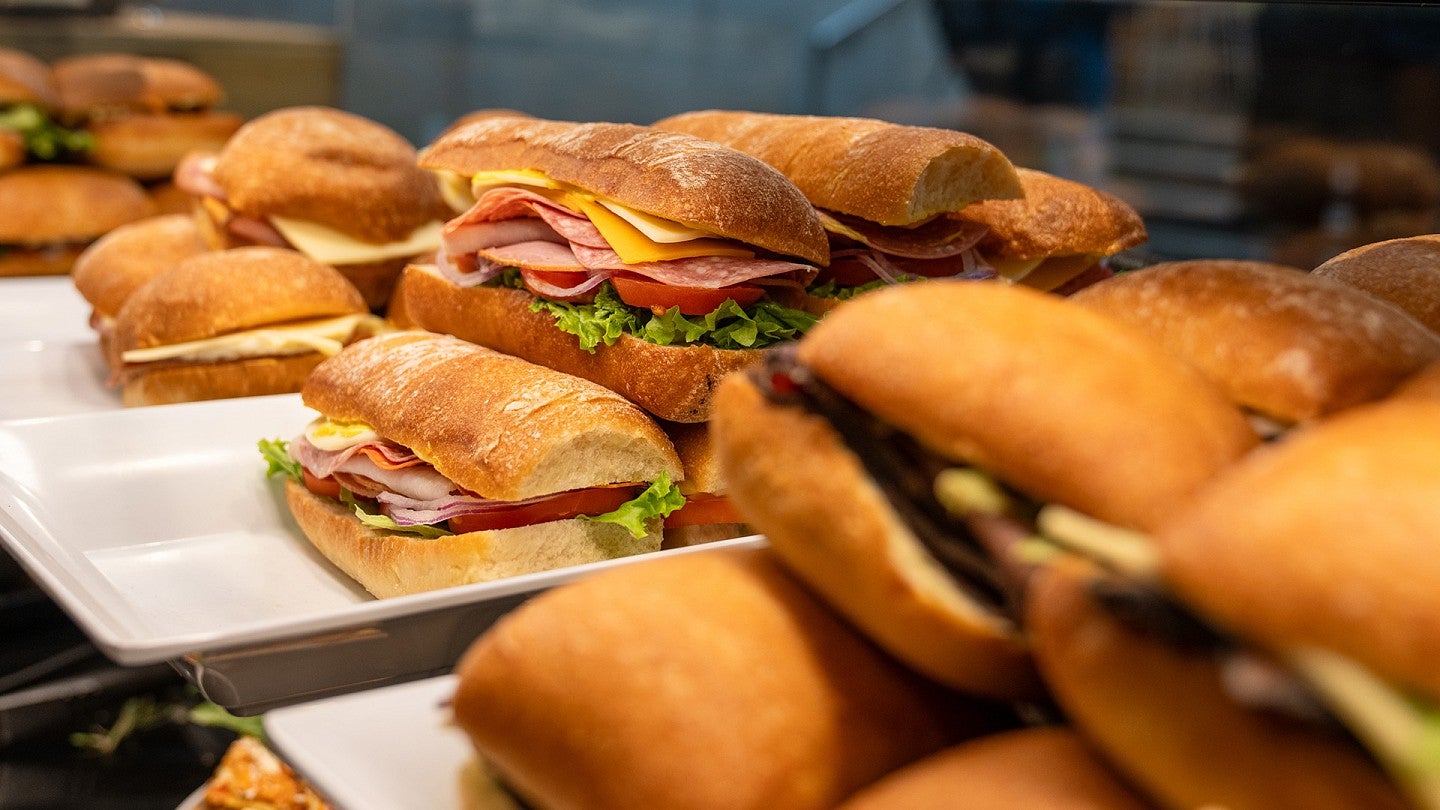
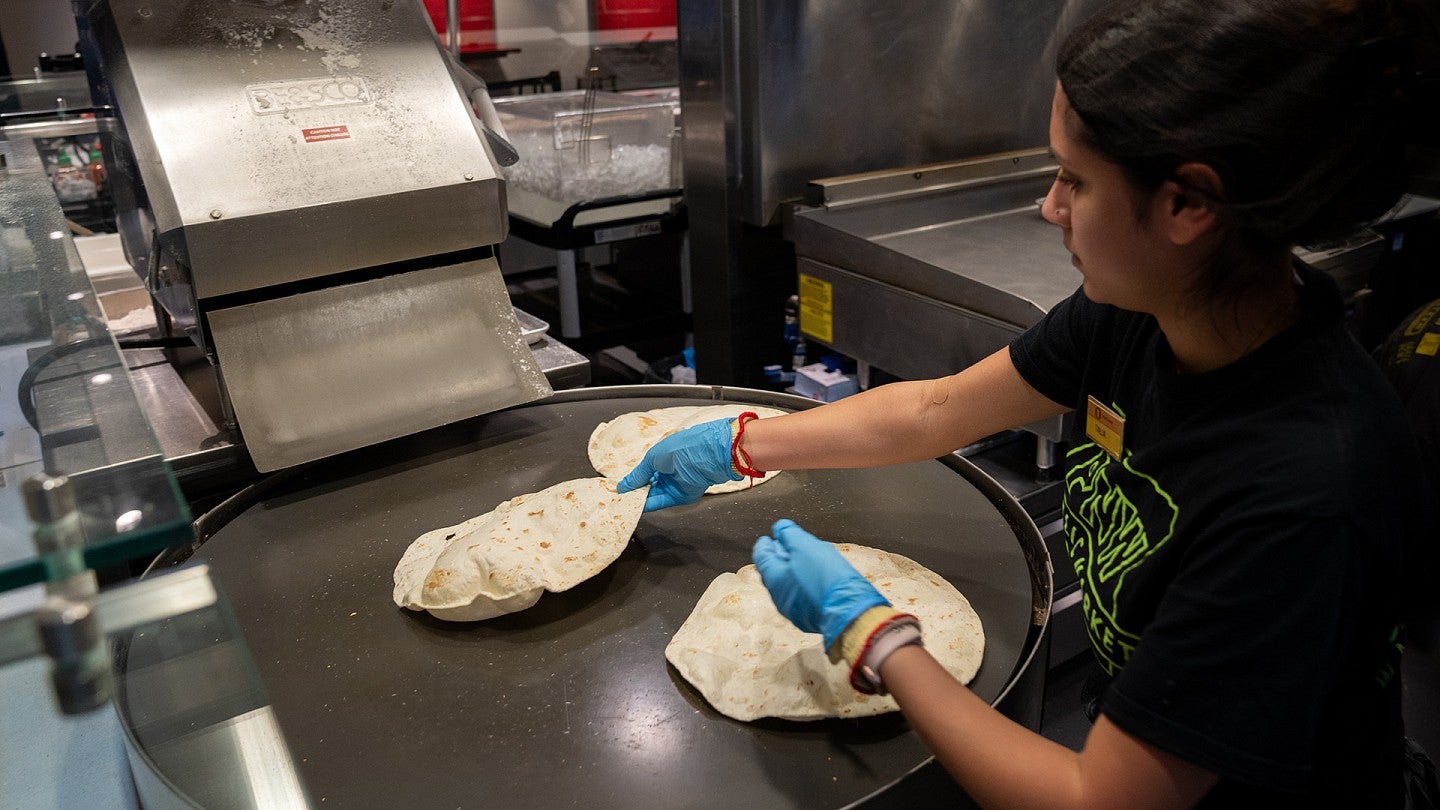
The UO also recycles its cooking oil through a partnership with Sequential Biofuels, which converts the cooking oil into biodiesel. And the university donates leftover food to Food for Lane County, a local nonprofit that reduces hunger around the region by distributing food to low-income people across Lane County.
Creating a greener future
As diligent as University Dining might be in its efforts to trim trash, leftover waste is always going to be a problem in food service. Like from vegetable offcuts, which include pepper cores, zucchini ends and watermelon rinds.
To find more ways to improve, the UO uses a software program called Leanpath, which tracks and documents the daily waste from the kitchens.
“Some waste is inevitable, but our goal is to minimize waste to the greatest degree possible,” Driscoll said. “We use this technology to help us measure and analyze waste so we can take action based on the data that we collect.”
Seeing patterns and photographs allows the chefs to identify new opportunities for waste-reducing measures in the kitchens and dining venues.
One big waste-reducing move that has been implemented is switching to a made-to-order model instead of using large serving vessels. That helps the chefs make only the necessary amount of food each day.
The UO also composts everything it can through Rexius, a local business that turns food waste into compost for the Eugene community. Last year, it composted tons of unusable food waste that benefited gardens and backyards around Eugene.
University Dining is always looking for more ways to act on the sustainability front, with waste and beyond.
One of the next sustainability measures will be attaching a carbon footprint label to food items so students can make informed decisions about what they’re consuming. That builds on the “Low Carbon Footprint Dinner” that University Dining hosts during Earth Week, which highlights foods that generate minimal carbon emissions.
The chefs also are making more vegetarian and vegan dishes because they offer a lower carbon footprint than meatier options. They’ve recognized that many students are interested in increasing their plant-based foods to reduce their personal environmental impact.
“We’ll keep doing everything we can to make our dining operations sustainable,” Driscoll said. “And we want to empower students to make the most sustainable choices and eat foods that are going to benefit their personal health — and the health of the environment.”


